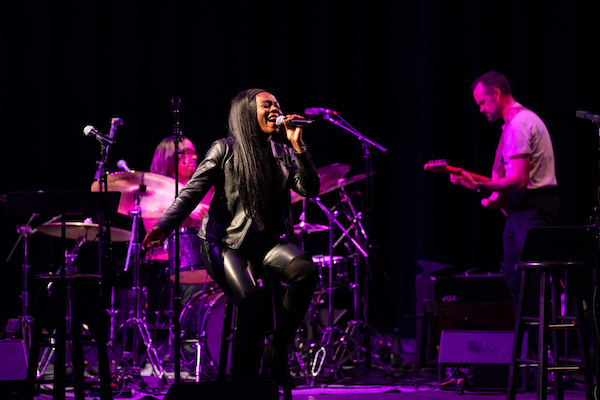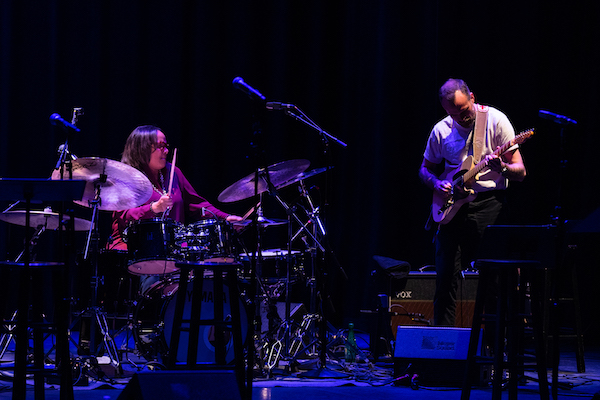Jazz Concert Review: Terri Lyne Carrington + Social Science — Solid Music and Message
By Jon Garelick
Terri Lyne Carrington, on her home turf (she’s a native Bostonian and holds several positions at Berklee, including being founder and artistic director of the Berklee Institute of Jazz and Gender Justice), augmented her six-piece band with three guests.
Terri Lyne Carrington + Social Science at Berklee

Terri Lyne Carrington at Berklee Photo: Robert Torres/Celebrity Series of Boston
“Protest music” can take many forms, and certainly jazz has had its share — to pick a random few: Mingus’s “Fables of Faubus” or “Meditations on Integration,” Max Roach’s “We Insist! (Freedom Now Suite)” with Abbey Lincoln, Sonny Rollins’s “The Freedom Suite,” John Coltrane’s “Alabama.” Sometimes there are lyrics, sometimes not. But for the message of these pieces to work, they must succeed first and foremost as music.
Terri Lyne Carrington’s Social Science succeeds on all counts, and if the message comes through, it’s because the music is so solid. That was true for the project’s 2019 double-CD Waiting Game, and it was equally true at the Celebrity Series of Boston concert at Berklee Performance Center on March 24. Carrington, on her home turf (she’s a native Bostonian and holds several positions at Berklee, including being founder and artistic director of the Berklee Institute of Jazz and Gender Justice), augmented her six-piece band with three guests. But this was not an open-house jam session. Every musician had a clear role to play. The first section of the program went on for 75 minutes, uninterrupted. There was not a wasted moment.
When Carrington came out with the band and sat behind her drums, she announced simply that the concert was dedicated to the memory of Wayne Shorter. Morgan Guerin started playing an a cappella tenor sax solo, Shorter’s recorded voice coming over the PA in one of his gnomic rambles (Victor Hugo, “other galaxies”) but with a clear message of peaceful coexistence. Guerin’s solo was measured and eloquent, and when the rest of the band came in (Carrington pattering a fast rhythm on her rims over a medium groove) it became Shorter’s “Fall.” The music ebbed and flowed with solos on the waves of Wayne’s elusive form, the cadences nearly unpredictable, with concise statements from trumpet guest Marquis Hill (with especially pointed narrative focus), guitarist Matthew Stevens, and pianist Isaac Wilson.
The singer Débo Ray came out and began a rap over the band on the Social Science number “Trapped in the American Dream”: “Maybe you do you and I could do me and we could be free,” alternating her raps with soaring melodic lines and intense backing from the band. The music throughout that first section of the show combined rock beats and cross-rhythmic grooves with hip-hop-inflected R&B and occasional swerves into musical theater pop.

(l to r) Terri Lyne Carrington, Débo Ray, and Matthew Stevens, Photo: Robert Torres/Celebrity Series of Boston
What made this mix compelling was the band’s orchestrations (the music mostly by Carrington with Stevens, and the album’s Aaron Parks, as well as other collaborators) and the execution. Aside from Ray — a charismatic performer who also happens to be another Berklee prof — Carrington locked in with Stevens and Guerin (who doubled on sax and electric bass) on some deathless grooves, especially an extended bit with guest rapper Toki Wright that was like Curtis Mayfield guitar-groove heaven over a Last Poets incantation.
Yes, Wright was that good. The litany in “No Justice (for Political Prisoners)” was as familiar as the name checks (Rosa Parks, Rubin “Hurricane” Carter, H. Rap Brown, MLK), but these were (contemporary) old stories made new. Resplendent in long brown coat, white pants, and skull cap, sitting on a stool downstage, Wright delivered his flow with, as Wynton might say in another context, relaxed intensity, the words making leaps in poetic thought in and around the beat.
I generally have trouble with rap in jazz — and these days, with few exceptions, rap in general. When I get on my jazz-nerd high horse, I condescend with “Ain’t nobody done nuthin’ since Biggie died!” (Sub in Bird, Trane). When I see rap performers, I often feel like the words are divorced from the music — the beats are just a background. But Wright — as well as Ray and MC Kokayi Issa — were with the music. Issa in particular not only solo rapped but also split antiphonal verses with Ray, the response to her call, and sometimes as DJ providing perfectly deployed scratch rhythms.

Terri Lyne Carrington and and Matthew Stevens at Berklee. Photo: Robert Torres/Celebrity Series of Boston
There were other wonderful moments, following the example of that first trumpet solo from Hill: arcing lines that worked as complete statements, at one with the music instead of indulgent add-on. There was equally beautiful playing from guest violinist Chelsey Green (another Berklee faculty ringer) on Joni Mitchell’s “Love.”
All of this was gracefully stage-managed, with guests like Wright and Green coming and going without a break in the music. Ray was an especially mesmerizing stage presence, tall, in black leather jacket and pants, her knee-high boots accentuating her height, “acting” the music with her hands, eyes, and body language as well as her voice and, like the other players, making nicely timed entrances or exits or simply standing off near the wings stage left, responding to the music as someone who had memorized the whole score. As I say, it was all of a piece.
When Social Science played one of NPR’s Tiny Desk concerts, Carrington said about the music, “It can be heavy, and we’re trying to figure out a way to make it feel good and still get the message.” At Berklee, it was mission accomplished.
Jon Garelick is a freelance writer. He is a former multiplatform editor of the Boston Globe opinion pages and former arts editor at the Boston Phoenix.
Tagged: Celebrity-Series-of-Boston, Débo Ray, Jon Garelick, Terri Lyne Carrington
